On Wednesday 19 March 2025, Rev. Henare Waaka (Ngāti Hauā) was ordained to the priesthood within Te Hui Amorangi ki Te Manawa o Te Wheke, at his marae Kai-a-Te-Mata in Morrinsville. The service was led by Bishop Ngarahu Katene, Archbishop Emeritus Philip Richardson and Archbishop Emeritus David Moxon.

His great-grandmother, Punia Hotene, helped bring the Hāhi Mihinare to their rohe in 1957 and was a pillar of the Church on their papakāinga. “That day, a lot of boxes were ticked – the marae, future plans, the priesthood. All part of sustaining the life of our people. We’ve always lived that way through Kīngitanga – to serve where and when we’re needed. Being on the pae means being in service, always.”
Born in Morrinsville, he spent his high school years in Australia and later raised his five children within Brisbane’s close-knit Māori community during the 80s and 90s — until life took an unexpected turn. A work accident became a spiritual awakening — a recurring dream during his rehabilitation stirred something deep. “I couldn’t speak properly in the dream,” he said. “But I was standing at the marae, trying to say something. Again and again, it came.”
That dream became the calling.
Nineteen years in Australia had left him missing his taha Māori. “Everyone was happy, but without purpose, something was missing,” he recalled. With the support from his mum and uncle, the beloved Rev. Haki Wirihana — who was 86yrs when Henare gave two years’ notice of his intention to return — he came home to Aotearoa in 2013.
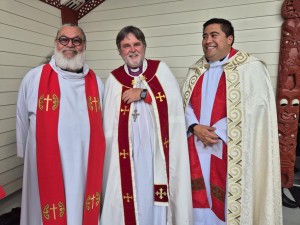
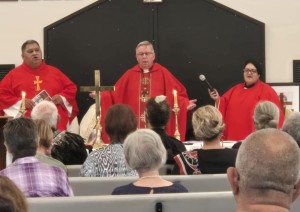
“When I did come home, there was a real sense of fulfilment. The reo was calling me back, and the Hāhi was always there, steady and unwavering. Following my Uncle Haki gave me the encouragement I needed to get back into the swing of things – the marae life, the call of the pae,” he says.
“There’s nothing better than jumping into the hot seat. He showed me everything we do at the marae. You get a bird’s-eye view from a minister’s perspective – it opens your eyes to a whole different side of service. I was working with prayer books, getting familiar between the red pages.”
By 2014, he was licenced as a Kaikarakia, and he never looked back.
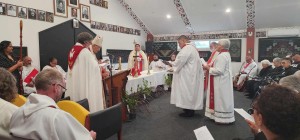
His journey through theology began formally at St John’s Theological College in 2019, where he studied towards a Bachelor of Theology. Living outside te ao Māori was challenging but affirming too. He made friends from all walks of life, each with a shared love for God.
He was placed at the Church of the Holy Sepulchre in Auckland for four years. Throughout COVID, Henare and the Holy Sepulchre team started online services for whānau, especially for those stuck overseas. “We had people tuning in from all over the world — some up at 4am to be part of it. Ka aroha.” It was the kind of ministry that blended old-school aroha with new-school tech, even if it meant accidently blowing up a few laptops along the way.
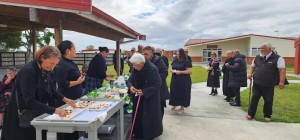
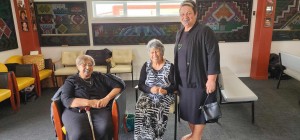
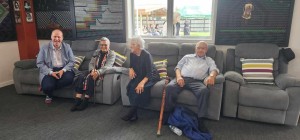
Henare is now the only licenced Anglican minister in Ngāti Hauā, serving his two Ngāti Werewere marae, including Rukumoana, the first parliament for the Kīngitanga built between 1915 – 1917.
Called home by Tumuaki Anaru Thompson, he started getting used to the flow of tangihanga, how it begins and ends. “We start from day one – sometimes earlier at the hospital – and it can run for three to five days. There’s a lot involved. When one marae is busy, another is too.”
“I’m licenced to officiate within the Diocese of Waikato and Taranaki, and work closely with Rev. Valerie Riches. It’s good to be part of that space, especially where understanding tangihanga isn’t common. I’ve come to appreciate how much mahi goes on in Tikanga Pākehā too. Still, it would be a privilege to one day have a solid base – stay in one place, follow a set calendar, and run with that for the year.”
“When I became ordained, my Uncle Haki – Dad’s oldest brother – felt he could finally retire. My return lifted a weight off his shoulders. It meant our Mihinare legacy would carry on, still alive for our people.”
“He said he’d waited a long time for this day. Spoke of our tūpuna and how proud they’d be to see the mahi passed to one of our own.”
“There was sadness for those who had gone, but also peace knowing the light hadn’t gone out. Uncle had feared no one would pick it up. I told him, “It’s ok – God will make a way.”
